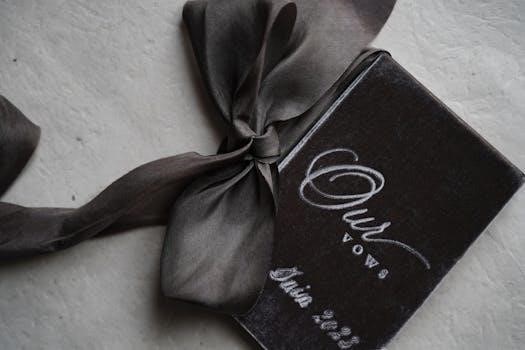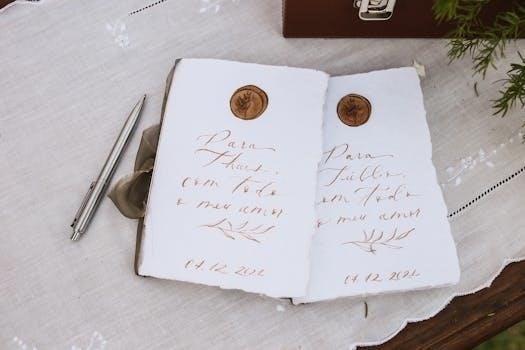Wedding ceremony scripts are vital for a smooth, meaningful service. They provide a framework, ensuring all essential elements are included, and help couples personalize their special day. These scripts guide the officiant and participants.
Understanding the Importance of a Wedding Ceremony Script
A wedding ceremony script is more than just words; it’s the blueprint for your most important day. It ensures a cohesive and meaningful flow, guiding the officiant and wedding party through each moment. Without a script, the ceremony can become disorganized, losing the emotional impact you desire. A well-crafted script allows for personalization, reflecting the unique love story of the couple. It helps to organize vows, readings, and music, making the ceremony a true representation of your shared journey. This document serves as a reference and helps in maintaining focus and intention throughout the event. It also ensures that all participants are on the same page. Ultimately, the script is vital in creating a memorable and cherished wedding ceremony.
Key Elements of a Wedding Ceremony Script
Key elements include the processional, welcome, readings, vows, ring exchange, pronouncement, and recessional. Each part contributes to the ceremony’s overall flow and significance.
The Basic Order of a Wedding Ceremony
The basic order typically begins with the processional, where the wedding party enters. This is followed by a welcome address by the officiant, setting the tone. Next, readings or a message may be shared. The heart of the ceremony involves the couple’s vows and the exchange of rings. After this, the officiant pronounces the couple married. Finally, the recessional concludes the ceremony as the newly married couple and the wedding party exit. This structure provides a clear sequence for the wedding, ensuring a smooth and meaningful experience for everyone involved.
Customizing the Ceremony Script
Customizing your wedding ceremony script is about making it uniquely yours. It involves adding personal touches that reflect your relationship and values. You can achieve this by incorporating specific readings, music, or rituals that hold special meaning for you. Consider including stories about your relationship, or personalized vows that express your commitment. The goal is to create a ceremony that feels authentic and resonates with you and your guests. Remember to discuss your ideas with your officiant to ensure they align with the overall flow of the ceremony.
Incorporating Readings, Vows, and Music
Incorporating readings, vows, and music into your wedding ceremony script adds depth and emotion. Readings can be from literature, poetry, or religious texts, chosen to reflect your beliefs and values. Vows are a personal declaration of commitment, and can be traditional or written by the couple themselves. Music sets the tone, whether it’s classical, contemporary, or a favorite song that is special to you. Carefully select pieces that enhance the atmosphere and support the message of your ceremony. Each of these elements should be thoughtfully integrated for a cohesive and meaningful experience.

Types of Wedding Ceremony Scripts
Wedding ceremony scripts vary widely, including religious, non-religious, and themed options. Each type offers a unique approach, tailored to different beliefs, values, and personal styles, allowing for a customized celebration.
Religious Wedding Ceremony Scripts
Religious wedding ceremony scripts are deeply rooted in tradition and faith, often incorporating specific prayers, readings, and rituals from a particular religion. These scripts typically include blessings, scripture passages, and symbolic acts that hold significant spiritual meaning for the couple and their families. They reflect the core beliefs and values of the chosen religion, creating a sacred and reverent atmosphere. These ceremonies often involve clergy or religious leaders who guide the service according to established practices. Couples choosing a religious script usually desire a ceremony that honors their faith and its teachings on marriage, seeking a union blessed by their chosen deity.
Non-Religious Wedding Ceremony Scripts
Non-religious wedding ceremony scripts offer a secular approach, focusing on the couple’s love story, values, and commitment to each other without religious references. These scripts often emphasize personal narratives, heartfelt vows, and readings that celebrate the couple’s unique relationship. They provide great flexibility, allowing couples to customize the ceremony to reflect their individual style and preferences. Non-religious ceremonies are often officiated by a friend or family member, or a professional celebrant, giving them greater control over the tone and content. The emphasis is on love, partnership, and the couple’s shared journey, making it a truly personal and meaningful event.
Themed Wedding Ceremony Scripts
Themed wedding ceremony scripts allow couples to express their personalities and shared interests by incorporating a specific theme into their ceremony. This can range from a historical period, a favorite book, movie, or a shared hobby. Themed scripts incorporate the chosen theme through readings, music, and even the officiant’s attire and language. These scripts can add a unique and memorable touch to the ceremony, creating an immersive experience for the couple and their guests. A well-executed themed ceremony reflects the couple’s distinct style, making their special day even more personalized and unforgettable, reflecting their unique bond.

Creating a Personalized Wedding Ceremony Script
Personalizing your wedding ceremony script is key to making the event uniquely yours. This involves collaborating with your officiant, writing custom vows, and selecting the right tone.
Working with an Officiant to Develop the Script
Collaborating with your officiant is crucial for creating a personalized wedding ceremony script. They bring experience and structure, helping you navigate the process. Start by sharing your vision, including your desired tone and style. Discuss your beliefs about marriage and your relationship, ensuring the script reflects your unique connection. Your officiant can offer suggestions for readings, vows, and music, while incorporating your preferences. This partnership ensures the ceremony feels authentic and meaningful, capturing the essence of your love story. They can also help with the flow, making sure the ceremony runs smoothly and keeps the guests engaged, making it a collective experience.
Writing Your Own Vows
Crafting your own vows adds a deeply personal touch to your wedding ceremony. This is your opportunity to express your unique love and commitment in your own words. Begin by reflecting on your relationship, identifying the moments and qualities that make it special. Consider sharing anecdotes, promises, and aspirations for your future together. Allow sufficient time to perfect your prose, ensuring your vows are rehearsed and heartfelt. Remember, your vows are primarily for each other, so focus on authenticity rather than appealing to your guests. Work with your officiant to determine the appropriate length and flow of this part of the ceremony.
Choosing the Right Tone and Style
Selecting the right tone and style for your wedding ceremony script is crucial for reflecting your personalities and relationship; Consider whether you prefer a formal, traditional approach or a more relaxed, modern feel. The tone can range from serious and solemn to lighthearted and humorous. Discuss your preferences with your officiant and ensure the script aligns with your vision for the day. The language, readings, and music should all contribute to the desired atmosphere. Ultimately, the tone and style should create a ceremony that is authentic and memorable for both you and your guests, capturing the essence of your love story.

Resources for Wedding Ceremony Scripts
Numerous resources offer help with wedding ceremony scripts. These include online libraries, script generators, and officiant guides, providing templates and inspiration to craft a personalized ceremony.
Wedding Ceremony Script Libraries
Wedding ceremony script libraries are invaluable resources, offering a wide array of templates and examples. These libraries often contain diverse scripts, including religious, non-religious, and themed options. They provide a starting point for couples and officiants, allowing for customization to reflect the couple’s unique story and preferences. Many libraries are curated by experienced officiants, ensuring authenticity and creativity. These resources help couples discover various styles, tones, and structures, guiding them in crafting a memorable and personalized ceremony. Exploring these libraries can help in planning the special day.
Wedding Ceremony Script Generators
Wedding ceremony script generators offer a modern, convenient approach to creating a personalized ceremony. These online tools often allow users to input specific details, such as the couple’s names, preferred tone, and desired elements, generating a tailored script. They provide a quick and easy way to draft a ceremony, especially for those who are unsure where to begin. While generators can be helpful, it’s important to review and refine the output to ensure it truly reflects the couple’s vision and love story. These tools can be a great starting point, but should not replace personalized touches.

Sample Wedding Ceremony Scripts and Examples
Exploring sample scripts provides valuable insight and inspiration. These examples showcase diverse styles, from modern to traditional, aiding couples in crafting their own unique and memorable ceremonies.
Modern Wedding Ceremony Script Example
A modern ceremony script often emphasizes the couple’s unique relationship and shared values, moving away from traditional formalities. It may incorporate personalized readings, contemporary music, and vows that reflect the couple’s individual expressions of love and commitment. The officiant’s role is often more conversational, creating a relaxed and inclusive atmosphere. This approach often includes elements like storytelling, where the officiant shares anecdotes about the couple’s journey. Modern scripts also frequently involve the couple expressing their feelings in their own words, making the ceremony more heartfelt and intimate. The focus is on authenticity and genuine connection, celebrating the couple’s individuality and their path to marriage. Modern scripts can be shorter and more concise, focusing on the essential elements of the union.
Traditional Wedding Ceremony Script Example
A traditional wedding ceremony script typically follows a set structure with established rituals and formal language. It often includes time-honored elements such as the processional, readings from religious texts, and the exchange of vows and rings. The officiant’s role is more formal, guiding the ceremony with respect to these traditions. This script emphasizes the sacredness and solemnity of marriage, often incorporating religious or cultural customs. The language used is often more formal and structured, reflecting the historical significance of the ceremony. Music choices are usually classical or traditional hymns. The focus remains on the established order and the importance of the vows being made, as well as the union of families. Traditional scripts are designed to honor time-honored practices and the gravity of the occasion.
Short and Sweet Wedding Ceremony Script Example
A short and sweet wedding ceremony script focuses on brevity and simplicity, ideal for couples who prefer a concise celebration. This type of script eliminates lengthy readings and elaborate rituals, opting for a streamlined approach that highlights the couple’s love and commitment. It often includes a brief welcome, short vows, the exchange of rings, and the pronouncement of marriage. The language is usually informal and heartfelt, reflecting the couple’s personal style. Music choices are typically kept simple as well. The main goal of a short and sweet script is to create a meaningful and intimate moment without unnecessary formalities. It’s perfect for couples who value efficiency and a focus on their personal connection, making sure the most important parts of the ceremony are highlighted.
